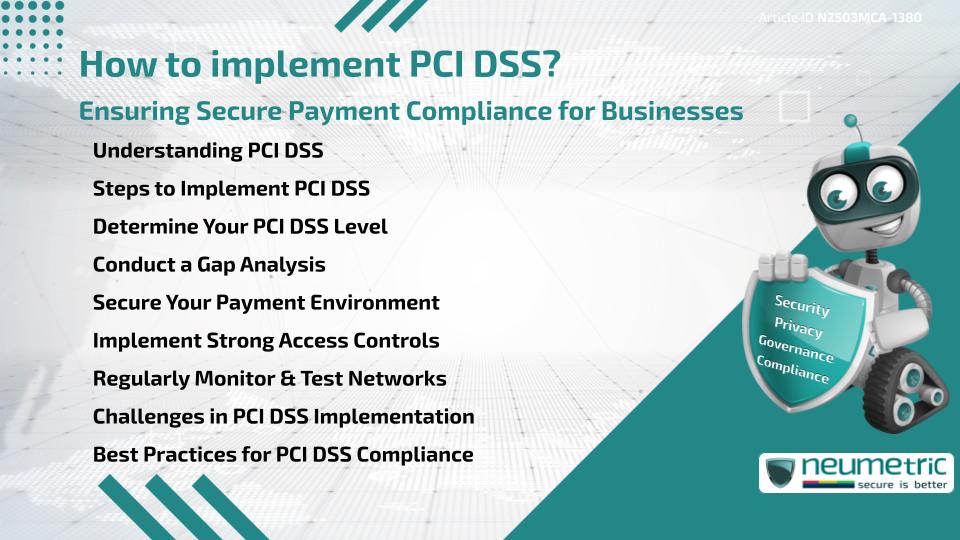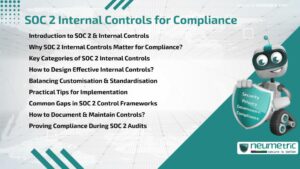Table of Contents
ToggleIntroduction
Businesses handling payment card transactions must comply with the Payment Card Industry Data Security Standard [PCI DSS]. This global security standard protects cardholder data & prevents fraud. Understanding how to implement PCI DSS is crucial for organizations processing, storing or transmitting credit card details.
This article outlines the steps to achieve PCI DSS compliance, its historical background, practical implementation, challenges & best practices.
Understanding PCI DSS
PCI DSS is a set of security requirements developed by major credit card brands, including Visa, Mastercard & American Express. The PCI Security Standards Council [PCI SSC] was formed in 2006 to ensure businesses follow consistent security measures to protect payment data.
Non-compliance can result in hefty fines, data breaches & reputational damage. Therefore, businesses must prioritize how to implement PCI DSS to secure payment transactions.
Steps to Implement PCI DSS
1. Determine Your PCI DSS Level
PCI DSS categorizes businesses into four (4) levels based on transaction volume. Merchants processing over six (6) million transactions annually have the highest security requirements. Understanding your level helps determine the necessary compliance steps.
2. Conduct a Gap Analysis
A gap analysis assesses current security measures against PCI DSS requirements. This process identifies vulnerabilities & areas needing improvement before a formal assessment.
3. Secure Your Payment Environment
Businesses must protect cardholder data by:
- Encrypting stored & transmitted card details
- Using secure firewalls & antivirus software
- Restricting access to payment information
4. Implement Strong Access Controls
Restricting employee access to payment systems minimizes unauthorized data exposure. Role-based access ensures only essential personnel handle sensitive information.
5. Regularly Monitor & Test Networks
Ongoing monitoring, vulnerability scans & penetration testing detect security flaws before they can be exploited. Automated security alerts enhance threat response.
6. Maintain Compliance Documentation
Organizations must keep detailed records of compliance activities, including:
- Security policies & procedures
- Risk assessments
- Incident response plans
7. Complete a PCI DSS Assessment
Businesses complete an Attestation of Compliance [AOC] or a Report on Compliance [ROC], depending on their merchant level. This step verifies adherence to PCI DSS standards.
Challenges in PCI DSS Implementation
Cost & Resource Allocation
Small businesses may struggle with the financial & technical requirements of how to implement PCI DSS. Compliance may require hiring cybersecurity experts or upgrading existing infrastructure.
Evolving Security Threats
Hackers constantly develop new tactics to breach payment systems. Businesses must continuously update security protocols to counter emerging threats.
Complexity of Requirements
Some organizations find PCI DSS requirements complex, especially if they operate in multiple regions with different regulations.
Best Practices for PCI DSS Compliance
Use Tokenization & Encryption
Tokenization replaces sensitive payment data with random tokens, reducing exposure in case of a breach. Encryption secures cardholder data during transmission.
Work with PCI-Compliant Vendors
Third-party service providers must also comply with PCI DSS. Businesses should verify vendor compliance to maintain security across payment channels.
Educate Employees on Security Protocols
Training employees on handling payment data securely reduces human errors that could lead to breaches.
Counter-Arguments & Limitations
While how to implement PCI DSS enhances security, some businesses argue that compliance alone does not guarantee total protection. Cybercriminals may still find vulnerabilities despite adherence to standards. Additionally, smaller businesses may find the cost & complexity burdensome.
However, PCI DSS remains a critical security benchmark that significantly reduces the risk of payment fraud & data breaches.
Conclusion
Implementing PCI DSS ensures secure payment processing & protects businesses from financial losses & reputational harm. While challenges exist, following best practices helps organizations achieve & maintain compliance.
Takeaways
- PCI DSS is essential for businesses handling card payments.
- Identifying merchant levels determines compliance steps.
- Security measures like encryption, firewalls & access control strengthen compliance.
- Regular monitoring & employee training reduce security risks.
- Despite challenges, PCI DSS enhances payment security & minimizes fraud.
FAQ
What is PCI DSS & why is it important?
PCI DSS is a security standard that protects payment card data. Compliance prevents fraud & ensures safe transactions for businesses & Customers.
How long does it take to implement PCI DSS?
The timeframe varies based on business size & existing security measures. Small businesses may need weeks, while larger enterprises may take months.
What happens if a business fails to comply with PCI DSS?
Non-compliance can result in fines, increased transaction fees, legal penalties & reputational damage due to data breaches.
Can small businesses implement PCI DSS easily?
While PCI DSS can be complex, small businesses can simplify compliance by using PCI-compliant payment processors & following key security practices.
Does PCI DSS compliance guarantee data security?
While compliance enhances security, it does not eliminate all risks. Businesses must continuously update security measures to counter evolving threats.




